
The lack of power supply in Gberefu, Badagry, Southwest Nigeria, has many negative implications to its people.
Gberefu is a coastal community of mostly farmers and fishers in Badagry, a border town in Lagos State, Southwest Nigeria. It was from here that thousands of Nigerians were kept and sold during the Trans-Atlantic slave trade. The sites and relics of that history are still there to remind visitors of the tourism allure of the community.
Many tourists and historians visit the town and regard it highly. Marlon Jackson, brother to late pop-icon, Michael Jackson, had once visited the waterside community with plans to build memorabilia that will cater to the country’s growing tourism industry, particularly African-American tourists who wish to trace their Nigerian roots.

Despite the community’s illumination on African history, it has remained in darkness.
In 20017, more than 50 electricity poles and transformers suddenly surfaced in Gberefu, to the delight of residents. The poles were installed from Aivoji, a neighbouring community and extended to Ganyingbo, and Yovoyan, ending at neighbouring Ilaje community. It was a project meant to bring electricity to the residents.
The community expected the electrification project to kick-off immediately and open up the town to tourists and businesses. But it never did. Residents are still waiting, decades later.
Today, the transformers rust away while the poles have become abodes for termites and rodents. It was a hope dashed and money wasted.

A mystery project
No one in the community seems to have any useful information concerning the project, including the traditional ruler, Najeem Sanni. He claims that the electricity project was abandoned for a proposed deep sea port project that never took off.
The story in the community is that some contractors had surfaced after the equipment was delivered. After informing Sanni that an electricity project would be delivered to the community, the engineers visited a few times and disappeared.
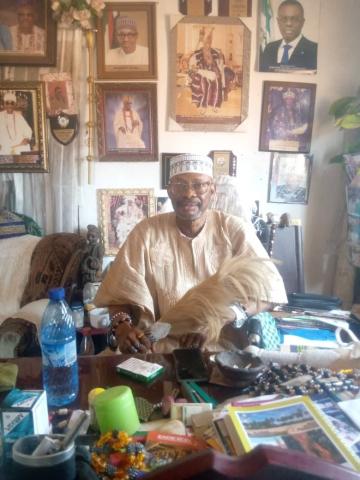
The contractor, Tommy Construction Company, Iwoye-Yewa Ogun, has a website but the address on the site could not be traced. The phone number on the website also connected to a wrong user when our reporter called the number.
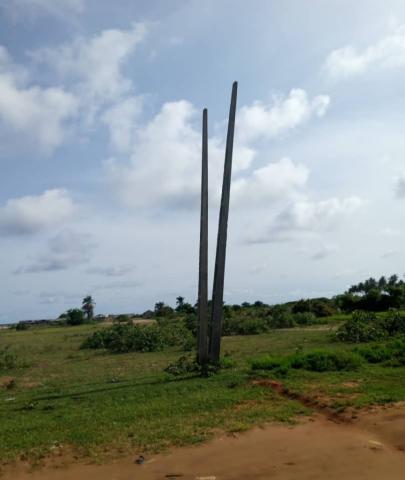
Efforts to track the company on the Corporate Affairs Commission website also didn’t yield any fruit as the system responded with “no record found.”
Some residents, following up on why the project was abandoned, told HumAngle it was a project of the Directorate of Food, Roads, and Rural Infrastructure (DFRRI), established in 1991 under the military regime of Ibrahim Babangida. However, no record was provided to support this.
DFRRI was established to, among others, provide economic and social infrastructure, including Feeder Roads, mobilisation for mass participation in rural development, production of agricultural inputs, and the development and dissemination of improved technology to enhance agricultural and rural housing.

Mr Sunny Ajose, who was said to have overseen the project, did not respond to calls and text messages.
Many young people in the community, like Jimoh Salako, the youth leader, grew up watching the utility poles rust. Salako told Humangle that the electricity infrastructure was part of the coastal road project that was intended to link Badagry to the Tarkwa Bay area of Lagos.
This reporter also visited the Lagos State Government Secretariat in Alausa to make further enquiries at the ministries of works, agriculture, and rural development to find out which is responsible for the defunct DFRRI.
The Director of Public Relations at the Ministry of Agriculture, Mr Jide Lawal, said that DFRRI was most likely inherited by the Ministry of Rural Development and Community Service.
HumAngle reached out to the Ministry of Local Government and Community Affairs without getting any useful clue.
An official of the Lagos State Ministry of Waterfront Infrastructure Development said that the project can only be taken over and completed after express permission from the Ministry of Energy and Natural Resources.
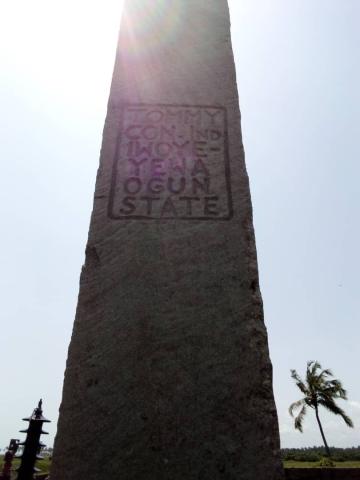
“Even when we create a scheme for rural infrastructure, we still have to liaise with the energy ministry; they, in turn, will work with the electricity company to see how the community can be connected to the grid,” he said.
David Otu, the Media Assistant to the Managing Director of Rural Electrification Agency, Ahmad Salihijo, in response to the query the reporter made to the agency in Abuja, requested for details of the project on a project sign post.
This reporter was, however, only able to provide the information on the transformer and the pole because the sign post had since been lost.
“Since this is all we have, no REA signboard, I have doubts if this project is ours. But I’ve forwarded all the images to the technical team,” he said.
There was no further communication from Otu afterwards.
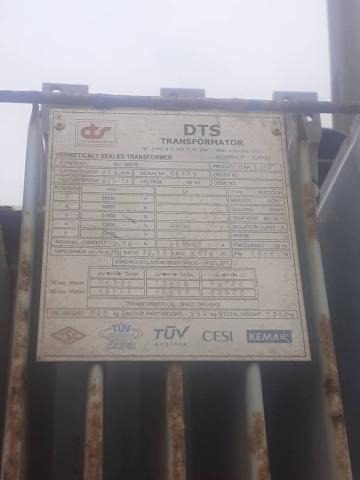
Further findings reveal that the transformers were separately provided as a Zonal Intervention Project of the Federal Government. Zonal Intervention Projects (ZIP) popularly known as constituency projects are nominated by lawmakers in the National Assembly (NASS) to serve members of their constituents.
Investigations show that the lawmaker, Rafeeqaut Onabamiro, who represented Badagry between 2011 and 2015 in the Federal House of Representatives, facilitated the electrification project.
The federal government allocates N100 billion yearly for the execution of constituency projects.
In a telephone conversation with Onabamiro, she said that the transformers given to the Gberefu community, is one of her projects in fulfillment of her campaign promises.
“I only had an obligation to deliver the transformers, it wasn’t part of my duty to get them electrified,” she said. She further explained that it is the community’s duty to get the transformer working as it is not part of her campaign promises.
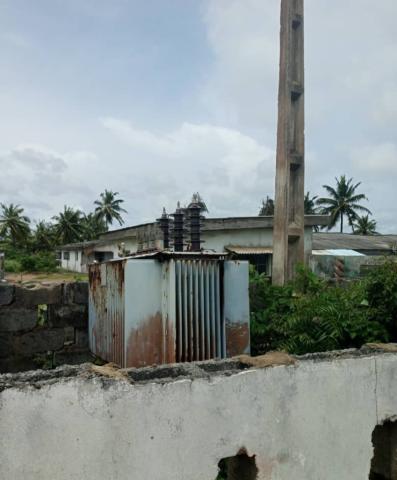
The lawmaker’s Personal Assistant, Rasheed Kuponu, told this reporter that the Energy Commission of Nigeria undertook the project in 2012. Director-General of the Commission, Mr Eli Jideere Baale, did not respond to emails sent to him.
Gberefu has remained a dark relic of the country’s history while its residents remain desperate and frustrated. They are left to the option of generators, to live like other Nigerians, with its attendant health and environmental implications.
Absence of electricity causing low school enrollment
On a hot Tuesday afternoon in October, pupils at the Local Authority School Keta-West, listen attentively as their teacher walks them through the lesson of the day. It is the only public school for children in Gberefu.
Pupils, wearing pink uniforms, sit on cement bricks in rapt attention as their teacher continues with her lesson.

Their teacher, Moriamo Agbatumo, who teaches a combined class of primary two and three, gives them an assignment to be submitted by the end of the week. She is, however, worried that many of them will struggle to do it.
“When I ask them why they don’t do their assignments, they say they don’t have light to do it when they get home,” she told Humangle, and added that many of her pupils have to study with lanterns and candles.

The reporter visited Sito-Gbethrome School which offers secondary level teaching to students coming from LA West Primary School, Keta West. The Principal, Agnes Oladapo, said she had thought the students do not enrol as a result of bad roads but she later realised that the power problem discouraged many from furthering their education.
The Principal said, of the 31 students posted to the school by the state government from Keta West, only six showed up in the ongoing registration process for the 2020/2021 session after six weeks of resumption.
Pupils of LA Primary School, Keta West sleeping during school hours as a result of inadequate teachers. Photo credit: Omolola Afolabi/Humangle
She added that 16 out of the 24 students from the school registered at their secondary school for the 2019/2020 academic session and only six of the 13 pupils posted from LA Primary School, Keta West registered at her school in 2017.
The above estimate shows a steady decline in the number of pupils who enrol in the secondary school from the only public primary school in Gberefu community.
Another teacher in the school, who didn’t want to be named for fear of government backlash, insisted on simply being addressed as “Miss Yemisi.” She bemoaned how the continual blackout affects the children’s psyche. She noted that students are forced to go to bed without studying.
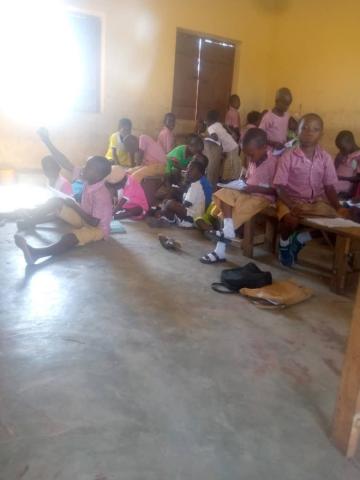
“My pupils do not even return their take-home assignments due to the lack of motivation they experience as a result of the age-long blackout,” she said.
“Many of my classmates have dropped out of school because of the light and the bad roads,” said Adoration Agbagba, who just graduated from Badagry Model College.
The 19-year-old told Humangle that the lack of power has frustrated her education. “The lack of light has affected our lives in several ways. One of them is the fact that we spend money on buying lanterns, candles, and kerosene every day.”
“When the lantern goes off, I lose the motivation to study as there is no alternative to continue. We sleep in the dark every day. If there was power, it would enable us to stay focused because, despite the struggle with light, I still managed to complete my secondary education.”
Eko Excel, not here
In Jan. 2019, the Lagos State Government in collaboration with the state education board under the Eko Excel program gave teachers and students a tablet and headset.
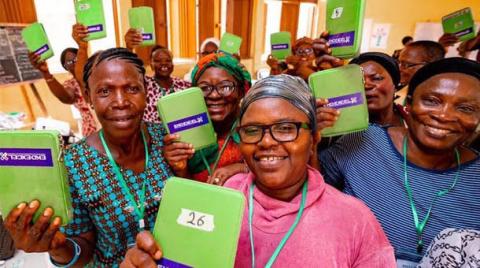
The programme, according to Governor Sanwo-Olu, is to equip pupils in the state’s public schools with ICT skills that would keep them at par with their counterparts globally.
Some of the teachers were seen using the device to teach their students, but a lot of students have stopped using their devices because they don’t have electricity at home and at the school to power them on. The devices were given to them to help enhance audio learning and phonics. According to one of their teachers, many parents “can’t afford generators and fuel.”
Brilliant school records
Despite the poor condition of learning in the community, those who managed to go to school show signs of academic excellence—a statement to the authorities on what the people can achieve if provided necessary amenities.
Available records show that students in the community recorded a 100% pass rate in the 2014 Common Entrance examinations. Gberefu and neighbouring Yovoyan communities with a population of over 4,000 people, have only two schools.
The proprietor of the only private school, Wilson Memorial Nursery and Primary school, Mr Innocent Glasglo, said the poor number of schools and state of the communities is responsible for its lack of basic infrastructure.
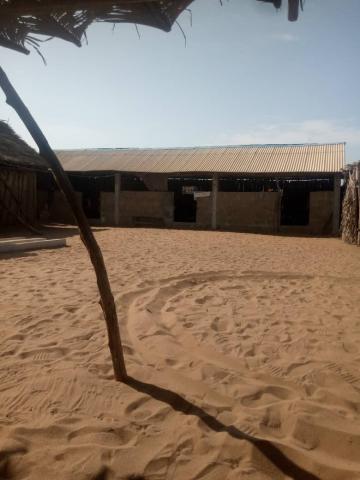
The school records show that in 2015, out of 19, seven scored above 60 cut-off marks; in 2016, there were three fails and in 2017, only three pupils scored above 50 out of a total of 19 pupils who sat for the Common Entrance Examinations. This is evident of a decline in the number of passes.
Glasgo said many pupils can’t use gadgets like tablets that would help them learn and carry out research on their own.
A key administrator in the school told this reporter many times that the number of pupils from the school posted by the Lagos State Government doesn’t correspond with the number who sat for the exams.
“I understand better the plight of those students now,” the principal said, adding that the electricity problems can impede the learning process of young learners.
This story was produced in partnership with Civic Media Lab under the Grassroots News Project